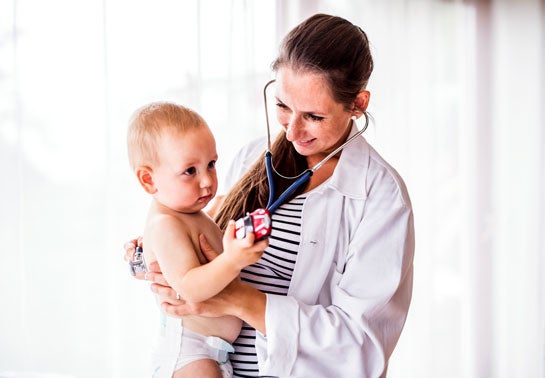Newborn Guide: Diapers, Bathing, and General Care
Newborn Guide: Additional Topics
Topic: General Care

Diaper Areas
Keep the baby’s diaper area as dry as you possibly can. That means frequent diaper changes or leaving the baby’s diaper area open to air. Either disposable or cloth diapers are satisfactory. On occasion, the baby’s skin will react to paper diapers or to detergent used with cloth diapers. Cloth diapers must be rinsed well after washing to minimize skin reactions.
If a rash does appear:
- Wash and rinse thoroughly
- Air dry at least 4 times a day
- Apply Desitin ointment liberally with each diaper change
- Call the office if this does not help clear the rash
Topic: General Care
column
Bowel Movements
Some babies have a bowel movement after each feeding. Others have one every 4-5 days. As long as the stool is not too firm (like marbles) or too loose (brown or green water), or bloody, don’t worry. Babies grunt, strain, yell, and even cry out with a bowel movement. These actions are not necessarily those of discomfort but represent the maximal effort an infant can exert in an attempt to expel stool. It is not considered constipation unless the stool is very hard.
Circumcision
First, you need to decide whether to have your son circumcised. Discuss this with your obstetrician who performs the procedure. We would also be happy to discuss this with you if you wish. If the circumcision is performed, you will notice that there may be a plastic ring around the tip of the penis after the procedure. This ring will usually fall off in 3-10 days. The circumcision requires no special care, although Vaseline may be applied to the end of the penis if it appears to be raw. It may be washed with soap and water just as the rest of the body. Please notify your obstetrician or us if you notice any pus or bleeding.
Pseudemenses (false period)
A female baby may have a menstrual period 3-5 days after birth. This is due to the effect of withdrawal of maternal hormones on the tissues of the baby’s uterus. It needs no treatment, and many times it is hardly noticeable.
column
Visitors
All of your well-meaning friends and relatives will want to admire your new baby and many will have advice for you. We would suggest that you minimize any close exposure to those who are ill. Common sense should prevail. May we suggest that you accept their helpful hints graciously but decide for yourself and consult us (if you wish) as to the advisability of these suggestions?
Clothing
Use common sense in selecting proper clothing for your baby. Your baby does not need to be overdressed. Dress your baby in the same weight clothing you are wearing.
Check-Ups
Please bring your baby to see us for regular medical check-ups. These visits will allow us to check your baby’s growth and development, talk with you about the care of your baby, and help you anticipate what is to come. The American Academy of Pediatrics recommends all babies be seen by a pediatrician 1-2 days after they are discharged from the hospital. We will want to see your baby again at about 2 weeks of age. The following checkups will be at 2, 4, and 6 months at which time immunization will be given. Please call the office to make these appointments. Office hours are 8:45am to 5:00pm, Monday through Friday.
General Care
Bathing
During the first 2 weeks of life or as long as the umbilical cord remains attached, your baby should receive only a sponge bath with a soft cloth. After the cord falls off, tub baths may be given. Very mild and un-perfumed soaps are less irritating. After a bath, gently dry the baby’s skin. Do not use lotions on the face or scalp, as those areas tend to be naturally oily.
When to Call University Pediatrics (Click to Expand)
When to Call University Pediatrics (Click to Expand)
Call us any time of the day or night if your baby has any of the following:
- Rectal temp of 100.4º or greater in a baby 2 months of age or less
- Unusually inactive or quiet
- Excessive crying for no reason
- Vomiting bile or blood
- Repeated vomiting (not just spitting up)
- Breathing hard (using abdominal muscles to breathe)
- Dusky or bluish coloring
If you are experiencing an emergency, you can call us any time of the day or night. If the office is closed, your call will be answered by a nurse who can answer most of your questions and suggest what to do. The nurse can always reach one of our physicians if needed. Our office is open Mon-Fri, 8:30am-5:00pm.
24/7 Phone: (309) 624-9680